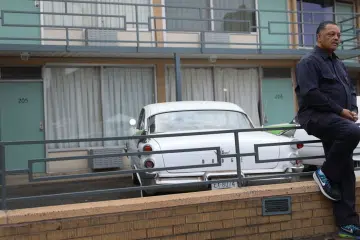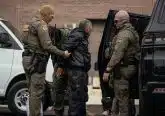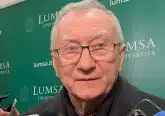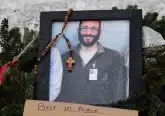Amid deportations, Catholic clergy rally for immigrants
EWTN News 2025-07-20By Kate Quiñones
CNA Newsroom, Jul 19, 2025 / 10:45 am
From Detroit to California to Florida, Catholic clergy are rallying to show support and solidarity for immigrants facing deportations.
While the Tennessee bishops and Bishop Alberto Rojas of San Bernardino recently granted dispensations to the Sunday Mass obligation for those who fear arrest, other Catholic clergy are attending marches to show solidarity and support for immigrants.
In Detroit, one Catholic priest took a unique approach — delivering a letter to U.S. Immigration and Customs Enforcement (ICE).
Father David Buersmeyer, the ombudsman of the Office of the Archbishop of Detroit, shared his growing concerns about immigration enforcement operations in a letter addressed to ICE’s Detroit field office and its director Kevin Raycraft.
“Over the last few months, not only in Detroit but throughout the nation, we have been seeing Immigration and Customs Enforcement personnel become more confrontational [and] less transparent, in ways that have created more fear and chaos among many of our immigrant communities,” Buersmeyer told CNA.
Buersmeyer is a chaplain for Strangers No Longer, a Michigan-based Catholic grassroots immigration advocacy group. Earlier this week, the group held a prayerful march to the local ICE office to deliver the letter, which was signed by Buersmeyer and the group’s board president, Judith Brooks.
Archbishop Edward Weisenburger of Detroit also joined the march, which was made up of several hundreds of people, including Catholic clergy, women religious, Protestant clergy, and Jewish leadership, according to Buersmeyer.
The procession began with prayer at the Most Holy Trinity Church — which Buersmeyer calls “a longtime symbol” for immigrants and those in need — and ended at the nearby ICE office.
Though the office refused to accept the letter at the door, Buersmeyer said the advocates passed the correspondence on to a congressman and a senator who agreed to deliver it to the director.
The letter cited concerns about facemasks and lack of identification of ICE agents during immigration action, urging the director to enforce ID requirements and ban facemasks. Additionally, the letter urged ICE to not act without a federal warrant and to communicate with local police during enforcement.
Finally, the letter criticized the separation of families when ICE arrests men, leaving women and children behind.
The Department of Homeland Security said in a statement this week that “rather than separate families, ICE asks mothers if they want to be removed with their children or if the child should be placed with someone else safe the parent designates.”
Despite being turned away at the door by ICE staff, Buersmeyer hopes for “dialogue.”
“Our hope is that enough people will come to see that the current procedures in place for treating immigrants leads too easily to inhumane, unjust, and unnecessary actions,” Buersmeyer said.
“That in turn can lead to a dialogue about national policies that can provide a more just and less knee-jerk framework for handling immigration cases.”
The subject of masking and identification is being discussed in Michigan and around the US. Earlier this week, the Michigan attorney general and other attorneys general sent a letter urging federal lawmakers to prohibit ICE officers from wearing masks.
Several federal Democrat legislators recently proposed a bill that would require ICE agencies to better identify themselves.
But in the same week, the Department of Homeland Security reported a spike in assaults and doxxing of ICE agents and expressed concern over “charged” rhetoric in the media.
“Because our city has a major ICE field office we wanted to let him know that there are large numbers of community leaders who have the pulse of the people being affected by these newer enforcement procedures and that there are ways to both respect the work that ICE needs to do and to lessen that fear and work more positively,” Buersmeyer said.
For Buersmeyer, the march was also about “solidarity” and living out Catholic social teaching.
“We wanted to publicly witness to our support of such communities,” he said.
Across the country in Los Angeles, a local Catholic priest had a similar goal — he hoped to bring spiritual guidance to his flock amid the unrest.
Father Brendan Busse, the pastor at Dolores Mission Church, said that intensified activity from immigration and customs enforcement has deeply shaken the people he serves.
In the largely Hispanic neighborhood of Boyle Heights, people are filled with “anxiety” and have to make “hard decisions,” Busse explained.
“We’ve received calls here at the parish — you know, ‘Father, I’m not sure our family feels safe coming to Mass,’” Busse told EWTN News President Montse Alvarado on “EWTN News in Depth” this week. “I think it’s affected everybody.”
Busse participated in a June 10 peaceful gathering in Los Angeles’s Grand Park as well as a procession to a federal building, along with other faith leaders including Los Angeles Archbishop Jose Gomez, who has repeatedly called for action on immigration reform.
“We walked between protesters and National Guardsmen in a moment that was very tense,” Busse recalled. “And we brought into that place a spirit of peace.”
The Diocese of San Bernardino faces similar challenges, leading to the archbishop’s decision to dispense Mass attendance for those affected by ICE activity.
John Andrews, a spokesman for the San Bernardino diocese, said that ICE has come onto parish property twice that he is aware of, including the arrest of a parishioner of Our Lady of Lourdes in Montclair.
“A man who was doing landscaping work on the parish property was taken into custody there, arrested, and was later taken to an immigration facility in Texas,” Andrews told “EWTN News In-Depth.”
In Florida, meanwhile, concerns have proliferated over the state’s so-called “Alligator Alcatraz,” a detention facility for illegal immigrants in the Everglades. State leaders have touted the facility’s remote location as well as its being surrounded by dangerous wildlife.
Venice, Florida, Bishop Frank Dewane said earlier this month that it was “unbecoming of public officials and corrosive of the common good” to speak of the threat of alligators and other dangerous animals in the context of the immigrants housed there.
Miami Archbishop Thomas Wenski, meanwhile, told “EWTN News in Depth” this week that his “greatest concern is the health and care of the people that are being detained there.”
“It’s in a very isolated place far away from medical facilities. It’s in a swamp that is very hot on a tarmac, which makes it even hotter,” the bishop said.
The archbishop said that advocates are calling for “a minimum of standards,” and that “one of those standards should be access to pastoral care.”
He described the difficulty of arranging Masses and spiritual care at the detention center, claiming that the Florida state government and the federal government are “arguing among themselves who is accountable for this place.”
The prelate said people should be aware of the difference between illegal immigration and “violent crime or felonies.”
“Most of the the immense majority of these people,” he said, “are here and working in honest jobs and trying to make a living for themselves and their families, trying to just have a future of hope for themselves and their families.”
Pope Leo XIV: Summer is a time to savor prayerful moments with God
Back to School Should be a Time of Joy, Not Fear
The Author
EWTN News
Founded in continued response to Pope John Paul II’s call for a “New Evangelization,” the Catholic News Agency (CNA) has been, since 2004, one of the fastest growing Catholic news providers to the English speaking world.













